|
|
|
Sort Order |
|
|
|
Items / Page
|
|
|
|
|
|
|
| Srl | Item |
| 1 |
ID:
187435
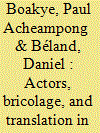

|
|
|
|
|
| Summary/Abstract |
Due to the centrality of education to economic growth and social development, successive governments in post-colonial Ghana have implemented policies to improve the quality of education in the country. In line with this, Ghana embarked on its first major education reform in 1987 under the Provisional National Defence Council (PNDC) government. While several studies have been conducted to explain this reform, these studies have largely been descriptive and theoretically, have over relied on the conditionality thesis. Our study draws on ideational literature and research interviews to offer an alternative explanation of the 1987 reform. Drawing extensively on the ideational concepts of bricolage and translation and focusing on the actors using these two mechanisms, the study argues that, while exogenous forces did impact the 1987 reform, it was mainly driven by endogenous factors featuring both path dependent and departing changes.
|
|
|
|
|
|
|
|
|
|
|
|
|
|
|
|
| 2 |
ID:
103709
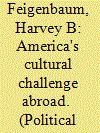

|
|
|
|
|
| Publication |
2011.
|
| Summary/Abstract |
Harvey B. Feigenbaum discusses the economic and cultural reasons for the spread of American pop culture and finds that political complaints by many countries about "Americanization" are well founded.
|
|
|
|
|
|
|
|
|
|
|
|
|
|
|
|
| 3 |
ID:
083489
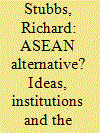

|
|
|
|
|
| Publication |
2008.
|
| Summary/Abstract |
Over the last 40 years ASEAN has developed a set of goals and norms with regard to the conduct of regional and international relations that provide an alternative paradigm to the dominant contemporary Western liberal approach to 'global' governance. ASEAN's alternative paradigm is rooted in Asia's cultures and the region's colonial and Cold War experiences. Using an historical institutionalist approach, the analysis details the paradigm's central features - the importance of neutrality; sovereignty and territorial integrity; the peaceful settlement of disputes; informal, non-confrontational negotiations; and the promotion of domestic stability and social harmony - which together underscore the importance of state autonomy and non-interference in the affairs of other states. The paradigm's influence in global affairs has increased markedly in recent years, most notably as the ASEAN-China linkage has matured and China has given its strong support to ASEAN's approach to the conduct of international relations. This turn of events suggests that the ASEAN paradigm presents a significant challenge to Western hopes for a common approach to 'global' governance.
|
|
|
|
|
|
|
|
|
|
|
|
|
|
|
|
| 4 |
ID:
158044
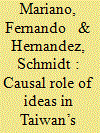

|
|
|
|
|
| Summary/Abstract |
While embracing trade policies that foster trade liberalization, Taiwan has clear protectionist policies covering its agricultural trade, which combine border measures with domestic support, and are closely modeled on the policies created by the European Union. The idea of multifunctionality of agriculture — and its link to trade policy — has created a normative framework whereby the agricultural markets have to be shielded in order for them to provide non-commodity attributes or public goods. This paper aims to explore the causal power of ideas (liberalization and multifunctionality) in the definition of Taiwan’s agricultural trade policy, by analyzing them from the perspective of historical institutionalism, and taking Taiwan as a case study. It is the institutionalization of the idea of multifunctionality that gives it an explanatory power toward understanding the ideational source of protectionism in agricultural trade.
|
|
|
|
|
|
|
|
|
|
|
|
|
|
|
|
| 5 |
ID:
075100
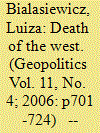

|
|
|
|
|
| Publication |
2006.
|
| Summary/Abstract |
The 'War on Terror' has justified a whole new set of re-territorialisations of security and identity, also in the 'West'. In this paper, I highlight one particularly powerful aspect of the idea of the 'West under threat': one wedded to the idea of a demographic-reproductive menace. Such ideas are not only the prerogative of extremist fringes, for the two authors whose work is discussed in this piece are very much part of the mainstream: Samuel Huntington, whose latest book Who Are We? America's Great Debate focuses on the 'deconstruction' of American identity and the threat represented by hyper-fertile immigrant populations and Italian writer-journalist Oriana Fallaci, whose two most recent books have launched an offensive against the 'Islamic Reverse Crusade' that threatens to 'submerge and subjugate' Europe.
Certainly, the intimations of a 'threat' to the West are in no way new, nor are they a unique product of the 'War on Terror'. What is new, however, is the force with which they are being articulated today and the ways in which they are entering into popular circulation, in both Europe and America. What is more, on both sides of the Atlantic, those raising the sound of alarm for 'The Death of the West' prescribe not only a re-affirmation of (Western) ideals, but also - and increasingly - a set of policies for the biological survival of the West. 'The Death of the West' is thus not only a parable of political and geopolitical decline, but also a morality play regarding real deaths and, especially, real births.
|
|
|
|
|
|
|
|
|
|
|
|
|
|
|
|
| 6 |
ID:
139686
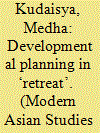

|
|
|
|
|
| Summary/Abstract |
This article concerns the history of economic planning in India in the late 1960s, when a vigorous debate took place on the institutions, instruments, and ‘personnel’ of developmental planning. Examining the years from 1967 to 1971, this article shows how dramatic attempts were made by warring politicians with the help of technocrats to decentralize economic planning, grant states more fiscal autonomy, and drastically reduce the powers of the Planning Commission. This article examines how these critical economic initiatives unfolded but were ultimately overshadowed by political power struggles in which the planning process and the Planning Commission became important tools in attempts for centralization.
|
|
|
|
|
|
|
|
|
|
|
|
|
|
|
|
| 7 |
ID:
100275


|
|
|
|
|
| Publication |
2010.
|
| Summary/Abstract |
While sociologists and political scientists have become interested in the role of ideas in the political process, relatively little work looks at how ideological claims are actually deployed in political discourse. This article examines the economic claims made in two pairs of Congressional debates over tax cuts, one (in 1962 and 1964) generally associated with Keynesian economic theories, and one (in 1978 and 1981) tied to supply-side ideas. While these bills were indeed initiated by groups subscribing to different economic ideologies, subsequent debates look surprisingly similar. The bills were closer in substance than one might expect, and while their proponents came from opposite political camps, in both cases supporters focused more on supply-side than demand-side effects and emphasized tax cuts' ability to pay for themselves through economic stimulation. The authors propose that politically acceptable economic claims may evolve more slowly than the economic theories that inspire policy entrepreneurs, and that this "discursive opportunity structure" may not only constrain the political process but may potentially shape the political effects of expert knowledge.
|
|
|
|
|
|
|
|
|
|
|
|
|
|
|
|
| 8 |
ID:
158574
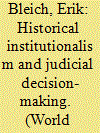

|
|
|
|
|
| Summary/Abstract |
This article integrates insights from different veins of historical institutionalism to offer an analytical framework that specifies how ideas, institutions, and actors account for key aspects of judicial decision-making, including change over time. To the extent that ideas are widely distributed, highly salient, and stable among actors in the judicial field, they can affect patterns of rulings in a particular issue area. The distribution, salience, and stability of norms, however, may change over time for reasons embedded in the institutional structures themselves. Existing policies, laws, or treaties create the potential for new actors to enter the judicial field through processes that theorists of institutional change have identified as intercurrence, displacement, conversion, layering, and drift. New actors can shift the relative salience of ideas already rooted in the judicial field. This ideational salience amplification can alter patterns of judicial decision-making without the fundamental and often costly battles involved in wholesale paradigm change. French high court hate speech decisions provide the context for the development of this framework and serve to illustrate the dynamic. The author uses evidence from an original dataset of every ruling by the French Court of Cassation regarding racist hate speech from 1972 through 2012 to explain the varying propensity of the high court to restrict speech that targets majorities compared to minorities.
|
|
|
|
|
|
|
|
|
|
|
|
|
|
|
|
| 9 |
ID:
177688
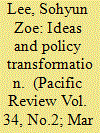

|
|
|
|
|
| Summary/Abstract |
Cross-regional free trade agreements (FTAs) have flourished in East Asia since the late 1990s. Japan and Korea were at the forefront of this trend. Nevertheless, most policymakers’ preferences orbited around region-oriented FTAs out of reluctance to make a sudden policy shift away from their conventional emphasis on World Trade Organization-based multilateral negotiations. The trend continued in Japan throughout the 2000s. In contrast, Korea took a sharp turn toward a cross-regional strategy in 2003. By the mid-2010s, this had created a significant gap in the two countries’ overall FTA partner choices. What caused policymakers’ ideas in the two countries to diverge from their initial focus on region-oriented FTAs? This paper focuses on the conditions that enabled policymakers’ ideas to explain the divergence by developing the contextual‒dynamic framework of FTA policies. At the dynamic level, individuals are more likely to emerge with new ideas when their expertise comes from outside the decision-making body, accompanied by their social qualities and power. Contextual conditions should also be met: the trade policy environment should reciprocate agent-level qualities to create a supportive atmosphere for policy change.
|
|
|
|
|
|
|
|
|
|
|
|
|
|
|
|
| 10 |
ID:
127670
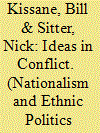

|
|
|
|
|
| Publication |
2013.
|
| Summary/Abstract |
The comparative study of civil war has recently gone through a "structural turn," towards large-n quantitative studies that explain the variation in the incidence of civil wars in terms of structural factors. The alternatives have been a return to case studies and a constructivist critique that emphasizes the role of ideas in conflict. While there is no a priori reason to reconcile these approaches, it remains a practical task for those who want to understand how a given social situation escalates into civil war. After reviewing the two poles in the debate, we mine the literature on nationalism for insights into this issue.
|
|
|
|
|
|
|
|
|
|
|
|
|
|
|
|
| 11 |
ID:
148866
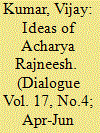

|
|
|
|
|
| Summary/Abstract |
Almost twenty-five years after his death Acharya Rajneesh is remembered
for his thoughtful speeches and lectures as a spiritual teacher. Dr Ram
Chandra Prasad his first biographer considered, him as the greatest
living orator in India (Motilal Banarsidas 1968). At his Samadhi at Pune
his epitaph reads “Osho was never born never died only visited this
planet earth 11.12.1931 to 19.01.1990.”
|
|
|
|
|
|
|
|
|
|
|
|
|
|
|
|
| 12 |
ID:
119234
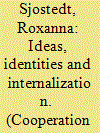

|
|
|
|
|
| Publication |
2013.
|
| Summary/Abstract |
Why do some events take precedence over others in terms of being viewed as security issues? This article argues that in order to answer this question it is necessary to move beyond the assumption that threat images are self-evident. Rather, a distinction should be made between the contextual conditions that may lay the foundation for a threat image and the subjective problem formulation by actors. In addition, in order to analyze how, why, and when an actor constructs a threat image and initiates a so-called securitization process, a broad conceptual and analytical framework should be employed. This article suggests a framework that incorporates ideas and identity at the international and domestic levels, and the internalization processes of the central decision-making unit performing the securitization. The article argues that while the diffusion of ideas by entrepreneurs forms an important basis for the threat constructions of national decision-makers, it is necessary to take the role of national and domestic identities into account in order to explain why some idea diffusion processes succeed while other do not. Identity serves as a catalyst or gate-keeper of idea diffusion. The internalization of the decision-making unit, finally, is a central mechanism that highlights the process between the explanatory factors and the outcome (securitization). By including these three concepts into the analysis, this article takes a holistic approach that can be employed to analyze different kinds of actor-based and non-actor-based threat images.
|
|
|
|
|
|
|
|
|
|
|
|
|
|
|
|
| 13 |
ID:
152138
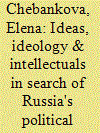

|
|
|
|
|
| Summary/Abstract |
The intellectual discourse of any state can function within two broad paradigms: consensual and pluralistic. In the first case, political elites, intellectuals, and the public agree on the base parameters of what constitutes “the good life” and argue about the methods of application. In the second case, participants hold radically different, incommensurable views, which coexist in society. This essay argues that the Western political system broadly rests on the politics of liberal consensus, formed throughout the period of capitalist modernization. But Russia's history took a different turn, following a path of alternative modernization. This engendered the politics of paradigmatic pluralism, in which a number of radically different politico-intellectual frameworks struggle for the dominant discourse. This essay examines these paradigms and argues that, due to the nature and substance of these models, fundamental change of Russia's dominant discourse, along with its main politico-institutional parameters, is unlikely.
|
|
|
|
|
|
|
|
|
|
|
|
|
|
|
|
| 14 |
ID:
145871
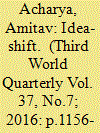

|
|
|
|
|
| Summary/Abstract |
An ‘idea-shift’ is taking place that may be of greater consequence for global governance than is the ongoing ‘power shift’ or the rise of new powers. A number of non-Western thinkers and practitioners - who may be called idea-shifters - have contributed to new concepts and approaches that have radically altered the way we think about development, security and ecology, among other areas. Their ideas are often dismissed or downgraded in the West as imitation, or the product of the Western education of their creators, or of partnership with Western collaborators, governments, donor agencies and multilateral institutions dominated by the Western powers. Challenging this view, this essay holds that ideas from the postcolonial world, its thinkers and policymakers have played an important role in the making of the postwar norms of governance, such as universal sovereignty, human rights, international development and regionalism. Moreover, some of the important recent ideas about development (human development from Mahbub ul Haq and Amartya Sen), security (responsible sovereignty from Francis Deng and colleagues) and ecology (sustainable development from Wangari Maathai) have come from people who, while trained in the West, are deeply influenced by their local context or point of origin. Appreciating how much this local origin and context matters allows us to consider these as ‘ideas-from-below’ and a powerful driver of the unfolding global idea-shift.
|
|
|
|
|
|
|
|
|
|
|
|
|
|
|
|
| 15 |
ID:
142263
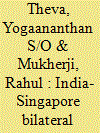

|
|
|
|
|
| Summary/Abstract |
This paper is a critical historical analysis of the trajectory of geo-political and economic relations between India and Singapore. This paper argues that India’s perception of its interests and its geopolitical orientation towards the Cold War prevented India’s security and economic integration with Southeast Asia. Apart from geopolitics, the economic orientation of India was also a critical factor that influenced the trajectory of India – Singapore economic engagement. However, there was a dramatic change after the Cold War ended. The structural change from bi-polarity towards a unipolar moment transformed both geopolitics and economic engagement. Moreover, India’s own economic orientation had also changed by the end of the Cold War. In sum, this paper attempts to elucidate upon how ideas construct economic and political interests and how geopolitical interests, once constructed, drive economic relations.
|
|
|
|
|
|
|
|
|
|
|
|
|
|
|
|
| 16 |
ID:
131888
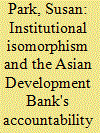

|
|
|
|
|
| Publication |
2014.
|
| Summary/Abstract |
In the 1990s Multilateral Development Banks created accountability mechanisms (AMs) that allowed people affected by development projects redress. Currently undertheorized, this paper examines how and why the Asian Development Bank (ADB) created an AM, and whether the AM serves its purpose to hold the ADB to account and to provide 'fair hearing of the views of the affected group'. This article argues that the ADB created a new AM because of institutional isomorphism, borrowing the idea of the AM from the World Bank as a result of coercive and mimetic isomorphic processes. Further, that the ADB introduced a mechanism ill-suited to the pre-existing (old) organizational culture of the ADB, which is based on consensus and hierarchical rule-following in the context of ADB operations to further economic growth while upholding state sovereignty. Despite its restructure and recent review, the mechanism's weakness was revealed through a stand-off between China and the AM over an investigation begun in 2009 (creating something 'blue'). The paper concludes that the AM's ability to serve its purpose will remain hampered as long as ADB maintains consensus around economic growth and state sovereignty over providing recourse to affected people.
|
|
|
|
|
|
|
|
|
|
|
|
|
|
|
|
| 17 |
ID:
172423


|
|
|
|
|
| Summary/Abstract |
Ideational variables have frequently been employed in positivist-minded and materialist analyses of state behaviour. Almost inevitably, because of these commitments, such studies run into theoretical challenges relating to the use of ideas. In this article, I suggest that integrating ideational factors in positivist and materialist approaches to state behaviour requires: (1) distinguishing conceptually between interests and ideation as well as between individual beliefs and social ideas; and (2) addressing challenges of operationalisation and measurability. To that end, I employ neoclassical realism as a case study. I argue that a re-conceptualisation of ideas as externalised individual beliefs employed in political deliberation allows neoclassical realists to focus on how ideas and ideational competition intervene in the transmission belt from materially given interests to foreign policy choice. At the same time, it more clearly operationalises ideas as identifiable in language and communication. I suggest this reconceptualisation, while consistent with realist paradigmatic assumptions, need not be limited to neoclassical realism. Instead, transposed to different paradigms, it would similarly allow positivist-minded constructivists and institutionalists to avoid a conceptually and methodologically awkward equation of different ideational factors.
|
|
|
|
|
|
|
|
|
|
|
|
|
|
|
|
| 18 |
ID:
107616
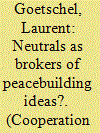

|
|
|
|
|
| Publication |
2011.
|
| Summary/Abstract |
Neutral and alliance-free states continue to exist. Even though neutrality has lost its realistic survival function, it continues to serve as provider of national identity for neutral states. This identity is rooted in neutrality's idealistic function, according to which neutral states used to engage for humanitarian issues and the reduction of violence in international relations. The argument developed suggests an extension of this traditional role concept of neutral states: they should engage as promoters of ideas in international peacebuilding which are contested because they are perceived as a threat to national sovereignty, such as the responsibility to protect (R2P). While neutrality's realistic functions make neutral states credible advocates of sovereignty and autonomy, its idealistic functions provide them with a track record in positive reforms in international relations. Acting as norm entrepreneurs, neutral states could reduce the contradiction between 'prevention' and 'intervention'. Therefore, the key argument of this article focuses on the basis of neutrality's conceptual roots, the conditions for success of political ideas and examples from recent peacebuilding practice.
|
|
|
|
|
|
|
|
|
|
|
|
|
|
|
|
| 19 |
ID:
181167
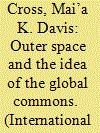

|
|
|
|
|
| Summary/Abstract |
Drawing upon fresh archival research and participant observation, the author traces the emergence and transformative idea of the non-weaponized and peaceful use of space from the 1920s to today. Building on this, the case study questions much of the common wisdom surrounding humans’ relationship with space over the past century. Although the beginnings of the Space Age are usually thought to have closely coincided with the Space Race beginning in 1955, the paper goes further back to the Spaceflight Movement of the 1920s and 30s, tracing the emergence of the idea of space as part of the global commons. This societal-level movement was highly transnational and collaborative in nature, and pushed for the achievement of human spaceflight decades before the technology existed, at the same time advocating for space as a peaceful domain for all of humankind. Using a new approach that also provides the basic ontological assumption for Model 3 of the special issue framework, the author argues that the impetus to engage in space exploration was fundamentally ‘ultrasocial’, defined as a human predisposition to be other-regarding, empathic, and inclined toward seeking wide-scale cooperation, even among strangers.
|
|
|
|
|
|
|
|
|
|
|
|
|
|
|
|
| 20 |
ID:
099795
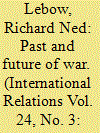

|
|
|
|
|
| Publication |
2010.
|
| Summary/Abstract |
An original data set of wars from 1648 to the present indicates that security and material interest are rarely the principal motives for war for rising, great or dominant powers. These states far more often go to war for reasons of standing. The empirical evidence offers no support for power transition, balance of power, Marxist or rationalist theories of war. The frequency of war between and among rising, great and dominant powers is likely to decline precipitously because the most important motives for war in the past - standing, security, revenge, material interests and domestic politics - are, for the most part, no longer served effectively by war. Changes in ideas, not changes in material conditions, are primarily responsible for this transformation.
|
|
|
|
|
|
|
|
|
|
|
|
|
|
|
|
|
|
|
|
|